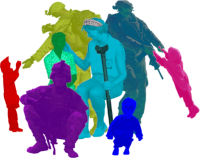
Slavery remains a pervasive issue, affecting millions of individuals who are trapped in exploitative conditions. This story follows the harrowing journey of a survivor, Danica, who was trafficked from her home country in Eastern Europe to a brothel in Western Europe, and ultimately rescued through the efforts of dedicated organizations fighting against human trafficking.
Danica grew up in a small village where economic opportunities were scarce. With limited access to education and employment, she faced immense pressure to support her family. In search of better prospects, she was lured by promises of legitimate work abroad. A trafficker approached her with an offer for a job as a waitress in a bustling city, assuring her that she would earn enough money to send back home.
Once Danica arrived in the foreign country, her situation quickly deteriorated. The trafficker confiscated her passport and documents, isolating her from any means of communication with the outside world. Instead of working as promised, Danica found herself forced into prostitution within a brothel. The environment was brutal; she endured physical violence and psychological manipulation designed to keep her compliant and fearful.
In the brothel, Danica was subjected to horrific conditions. She worked long hours without pay and faced constant threats from both the traffickers and clients. The trauma she experienced was compounded by feelings of hopelessness and despair. Despite these challenges, Danica held onto the hope that one day she might escape this nightmare.
After several months of captivity, an outreach worker from a local NGO visited the brothel as part of an initiative to identify victims of trafficking. During this visit, Danica mustered the courage to speak with the worker about her situation. This moment marked a turning point; it opened up possibilities for rescue and rehabilitation.
With information gathered from Danica and other survivors, law enforcement agencies coordinated a raid on the brothel. On that fateful day, officers stormed in while Danica was preparing for another night’s work. The chaos that ensued led to multiple arrests of traffickers and clients alike. For Danica and others trapped inside, it was a moment filled with fear but also relief—freedom was finally within reach.
Following their rescue, survivors like Danica were taken to safe houses operated by NGOs specializing in recovery programs for trafficking victims. Here they received medical care, psychological support, legal assistance, and vocational training aimed at reintegrating them into society. For Danica, this period was transformative; she began to heal from her traumatic experiences while gaining skills that would empower her future.
After several months in rehabilitation, Danica decided to return home—not just as a survivor but as an advocate against human trafficking. She participated in awareness campaigns aimed at educating others about the dangers of trafficking and sharing her story to inspire hope among those still trapped in similar situations.
Danica’s journey is emblematic of many survivors who endure unimaginable hardships yet find resilience through support systems designed to help them reclaim their lives. It highlights the importance of continued vigilance against human trafficking globally and underscores the need for comprehensive strategies involving law enforcement, NGOs, and community engagement.
By sharing stories like Danica’s, we can foster greater awareness about modern slavery and encourage collective action towards its eradication.
